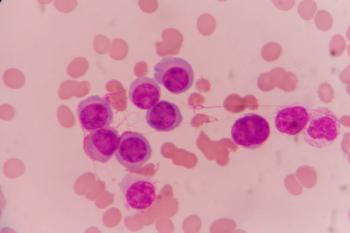
Matthew Davids, MD, MMSc, associate professor of medicine at Harvard Medical School, discusses how the results of a longer term study differ for individuals who were younger with chronic lymphocytic leukemia as opposed to those who are older.

Matthew Davids, MD, MMSc, associate professor of medicine at Harvard Medical School, discusses how the results of a longer term study differ for individuals who were younger with chronic lymphocytic leukemia as opposed to those who are older.

Myriam Mendila, MD, chief medical officer and global head of medical affairs at Novartis Oncology, discusses ongoing trials assessing efficacy and safety of asciminib in the treatment of chronic myeloid leukemia.

The standard-of-care for patients with LBCL consists of chemotherapy and additional high intensity chemotherapy followed by stem cell transplantation.

CAR T-cell therapy shows durable long-term survival in patients with refractory LBCL, company’s Kite subsidiary says.
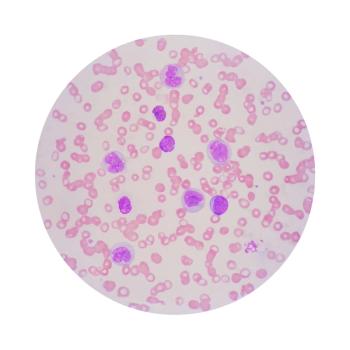
Matthew Davids, MD, MMSc, associate professor of medicine at Harvard Medical School, discusses what the results of the initial iFCR study showed and what the highlights of the longer-term follow up were for individuals with chronic lymphocytic leukemia.
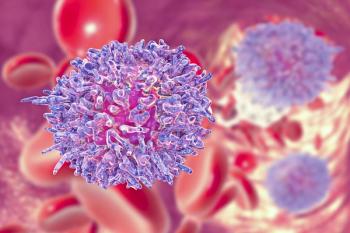
Matthew Davids, MD, MMSc, associate professor of medicine at Harvard Medical School, discusses how iFCR therapy increases the chance of functional cure for younger individuals with chronic lymphocytic leukemia.
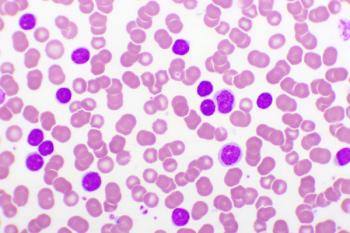
Lindsey Roeker, MD at assistant attending L1, Memorial Sloan Kettering Cancer Center, discusses her ASH 2021 presentation and addresses how the study design could affect future studies.

Myriam Mendila, MD, chief medical officer and global head of medical affairs at Novartis Oncology, discusses how the ASCEMBL study data may impact treatment strategies and approaches for patients with chronic myeloid leukemia.

Following the success of ibrutinib, second-generation BTK inhibitors have shown even better outcomes with fewer toxicities.

Lindsey Roeker, MD at assistant attending L1, Memorial Sloan Kettering Cancer Center, discusses her ASH 2021 presentation and addresses the study design and the sample demographics.
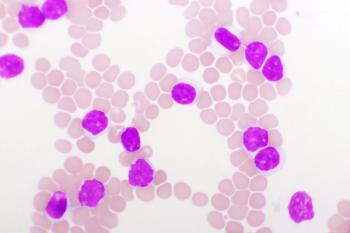
Lindsey Roeker, MD, assistant attending L1 at Memorial Sloan Kettering Cancer Center, discusses her ASH 2021 presentation and addresses the highlights of the study and how the add-on approach affect the treatment of CLL.

The body of research around acalabrutinib is becoming quite advanced, allowing clinicians to feel confident when treating patients.

Lindsey Roeker, MD, assistant attending L1 at Memorial Sloan Kettering Cancer Center, discusses her ASH 2021 presentation and addresses how the addition of umbralisib and ublituximab affect those being treated with ibrutinib.

Myriam Mendila, MD, chief medical officer and global head of medical affairs at Novartis Oncology, discusses how asciminib has impacted the treatment landscape for chronic myeloid leukemia.

New data are being presented at ASH 2021 regarding the durable efficacy of acalabrutinib in chronic lymphocytic leukemia.

The multicenter phase 3 study randomized patients with R/R CLL 1:1 to receive acalabrutinib 100 mg orally twice daily or investigator’s choice of idelalisib plus rituximab or bendamustine plus rituximab until disease progression or unacceptable toxicity.

Lindsey Roeker, MD, assistant attending L1 at Memorial Sloan Kettering Cancer Center, discusses her ASH 2021 presentation and addresses some of the challenges and risk of ibrutinib as treatment for CLL.

The combination therapy of ibrutinib and venetoclax was superior to chlorambucil and obinutuzumab in terms of undetectable minimal residual disease responses in elderly or unfit patients with previously untreated chronic lymphocytic leukemia.

In a phase 1b trial, the combination therapy of acalabrutinib, venetoclax, and rituximab had a 100% clinical response rate and was well-tolerated in patients with treatment-naïve mantle cell lymphoma.

Acalabrutinib is a Bruton tyrosine kinase inhibitor (BTKi) intended for the treatment of adult patients with mantle cell lymphoma who have received at least 1 prior therapy.
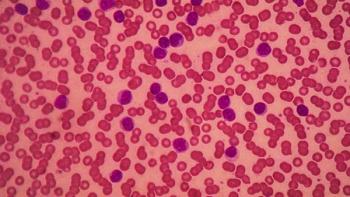
The investigators said that there were no new safety signals identified, and no reported instances of tumor lysis syndrome.

Results highlight sustained benefits of avapritinib in patients with advanced systemic mastocytosis.

Pharmacy Times interviewed Jason Valent, MD, of the Cleveland Clinic the next steps for his CAEL-101 findings, a treatment for patients living with amyloid light chain amyloidosis.

Pharmacy Times interviewed Jason Valent, MD, of the Cleveland Clinic his recent CAEL-101 findings, and how it can help shape treatment for patients living with amyloid light chain amyloidosis.

Pharmacy Times interviewed Jason Valent, MD, of the Cleveland Clinic about what CAEL-101 is, how it works, and how it is used to treat patients with amyloid light chain amyloidosis.

Pharmacy Times interviewed Jason Valent, MD, of the Cleveland Clinic about his new research surrounding CAEL-101, a treatment for patients living with amyloid light chain amyloidosis.

Per Morten Sandset, MD, of the University of Oslo and Oslo University Hospital, discusses the treatment considerations necessary to properly manage a patient with congenital plasminogen deficiency after she became pregnant.

Per Morten Sandset, MD, of the University of Oslo and Oslo University Hospital, discusses the details of a patient who had a successful pregnancy despite documented infertility due to congenital plasminogen deficiency.

Per Morten Sandset, MD, of the University of Oslo and Oslo University Hospital, discusses the disease impact on the gynecologic system and how often patients become infertile due to this impact.

Per Morten Sandset, MD, of the University of Oslo and Oslo University Hospital, details the treatment options available for patients with congenital plasminogen deficiency.